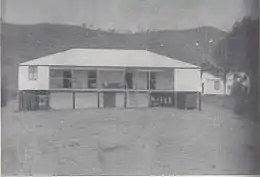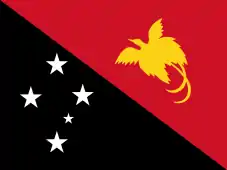Governor-General of Papua New Guinea
The Governor-General of Papua New Guinea is the representative of Papua New Guinean monarch, Queen Elizabeth II, who is known in Tok Pisin as 'Missis Kwin'.
| Governor-General of Papua New Guinea | |
|---|---|
 | |
 | |
| Viceroy | |
| Style | His Excellency |
| Residence | Government House, Papua New Guinea |
| Appointer | Monarch of Papua New Guinea |
| Term length | At His/Her Majesty's pleasure (Usually Six years) |
| Formation | 16 September 1975 |
| First holder | Sir John Guise |
| Salary | 56,249 USD annually[1] |
 |
|---|
| This article is part of a series on the politics and government of Papua New Guinea |
Name
As in all other Commonwealth realms except Canada, the vice-regal officer's title is spelt with a hyphen. The plural is Governors-General.
Appointment

Unlike most other Commonwealth realms, the Governor-General of Papua New Guinea is nominated by the country's Parliament,[2] rather than being proposed by its prime minister (as is the convention in the other Commonwealth realms). The appointment is made by the head of state of Papua New Guinea, Queen Elizabeth II, following a simple majority vote of the National Parliament.[3]
The term in office is six years.[4]
To be appointed for a second term, the Governor-General must be supported by a two-thirds majority in the National Parliament.[5] No person may serve for more than two terms.[5] Thus far all retired Governors-General have been knighted.
If the office of Governor-General becomes vacant, due to death or dismissal, the speaker of the National Parliament of Papua New Guinea becomes acting Governor-General until a new appointment is made.[6]
Dismissal
The Governor-General may be dismissed by either a decision of the National Executive Council or an absolute majority of the National Parliament.[7] No governor-general has been dismissed from office, although in 1991, Sir Vincent Serei Eri resigned from office after Prime Minister Sir Rabbie Namaliu advised the Queen to dismiss him.
Governors-General of Papua New Guinea
| No. | Image | Name (Birth–Death) |
Tenure | |
|---|---|---|---|---|
| Term of office | Notes | |||
| 1 | Sir John Guise (1914–1991) |
6 September 1975 – 1 March 1977 | Resigned from office to contest election. | |
| 2 | Sir Tore Lokoloko (1930–2013) |
1 March 1977 – 1 March 1983 | ||
| 3 | Sir Kingsford Dibela (1932–2002) |
1 March 1983 – 1 March 1989 | Resigned from office. | |
| 4 | Sir Ignatius Kilage (1941–1989) |
1 March 1989 – 31 December 1989 | Died in office. | |
| 5 | Sir Serei Eri (1936–1993) |
27 February 1990 – 4 October 1991 | Resigned from office, due to dismissal instructed to the Queen by the Prime Minister. | |
| 6 | Sir Wiwa Korowi (1948–) |
18 November 1991 – 20 November 1997 | ||
| 7 | Sir Silas Atopare (1951–) |
20 November 1997 – 20 July 2004 | ||
| 8 | .jpg.webp) |
Sir Paulias Matane (1931–) |
25 July 2004 – 13 December 2010 | Elected by the National Parliament (50–46), on 27 January 2004. |
| 9 | .jpg.webp) |
Sir Michael Ogio (1942–2017) |
25 February 2011 – 18 February 2017 | Elected by the National Parliament (65–23), on 14 January 2011. Died in office. |
| 10 | Sir Bob Dadae (1961– ) |
28 February 2017 – present | Elected by the National Parliament (55–36), on 1 February 2017. | |
See also
| Wikisource has original text related to this article: |
References
- HON. PATRICK PRUAITCH, CMG, MP, MINISTER FOR TREASURY. "2017 BUDGET ESTIMATES OF REVENUE AND EXPENDITURE FOR NATIONAL GOVERNMENT DEPARTMENTS" (PDF). www.treasury.gov.pg.CS1 maint: multiple names: authors list (link)
- . Constitution of the Independent State of Papua New Guinea, section 88 – via Wikisource.
- . Constitution of the Independent State of Papua New Guinea, section 88(2) – via Wikisource.
- . Constitution of the Independent State of Papua New Guinea, section 91 – via Wikisource.
- . Constitution of the Independent State of Papua New Guinea, section 87(c) – via Wikisource.
- . Constitution of the Independent State of Papua New Guinea, section 95 – via Wikisource.
- . Constitution of the Independent State of Papua New Guinea, section 93 – via Wikisource.
